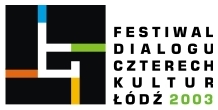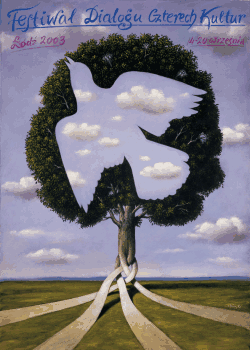2nd edition
“All roads lead to Łódź. This will be one of the most exciting cultural events in Poland,” announced Michał Merczyński, artistic director of the Festival since its second edition, then also the director of Warsaw’s Rozmaitości Theatre and the Malta Festival in Poznań. The second Four Cultures Festival lasted from 14 to 20 September 2003.
The unquestionable highlight of the Festival was a concert of the Israel Philharmonic Orchestra under the baton of the legendary Zubin Mehta, ranked among the greatest conductors in the world. The excellent ensemble, dubbed “the orchestra of soloists”, was founded in 1936 by Bronisław Huberman, a Jewish violinist of Polish origin born in Częstochowa. Most of its musicians came from Poland, many of them from the multiethnic Łódź of the interwar period. The Orchestra’s first concert in 1936 was led by Arturo Toscanini, the best conductor of the era. The Orchestra has worked with an array of renowned conductors from all over the world, including such contemporary Polish masters as Witold Lutosławski and Krzysztof Penderecki. Since 1977, it has been under the leadership of Zubin Mehta, who is equally famous as a music director of opera productions and a conductor of symphony concerts. For the inauguration at the Wielki Theatre the musicians selected Gustav Mahler’s Symphony no. 7 in E minor, which they dedicated to the memory of Artur Rubinstein.
An important local feature of the Festival was an exhibition of Katarzyna Kobro’s sculptures. Replicas of two of her works, four times their original size, by Tomasz Matuszak and Zbigniew Dudek from the Sculpture Studio of the Łódź Academy of Fine Arts, were placed on the site of the former Poznański Factory. Katarzyna Kobro (1898-1951), the daughter of a German father and a Russian mother, wife of the Polish artist Władysław Strzemiński, spent most of her adult life in Łódź. She is regarded as one of the finest representatives of Polish avant-garde art. She made sculptures based on mathematical calculations. “Kobro is a perfect symbol of the dialogue of four cultures,” emphasized Mirosław Borusiewicz, director of the Museum of Art, at the opening of the exhibition.
In addition to theatre performances, concerts and exhibitions, there was a survey of video art entitled “Homemade”, showcasing the work of thirty Israeli artists. The weekly “Polityka” hosted a discussion salon, which has become a Festival fixture.
Most of the events took place at the Manufaktura, the old factory complex of Izrael Kalmanowicz Poznański at Ogrodowa Street. Three tents were erected there, for music (2000 seats), theatre (600 seats) and circus activities (380 seats). Several events were planned in Shop no. 9. Michał Merczyński created “the city of tents” with a view to revitalizing the 27-hectare area in the city centre which had been defunct for 13 years. The Manufaktura was transformed into an art village teeming with life from morning till night.

Festival poster



